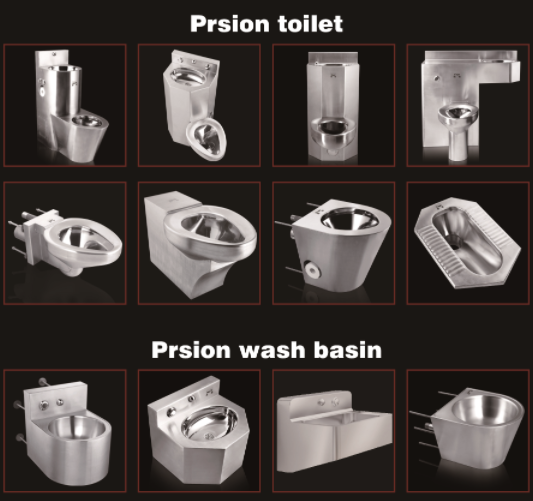In the realm of corrections and detention facilities, maintaining high standards of hygiene and security is of utmost importance. Stainless steel toilets, particularly those designed for solitary facilities, play a crucial role in meeting these standards. Here's a detailed exploration of high-security, vandal-resistant stainless steel toilets for solitary facilities:
Solitary facilities, such as prisons, holding cells, and detention centers, face unique challenges when it comes to sanitation. The solitary toilets in these environments must withstand rigorous use while maintaining hygiene and security. Traditional toilets are often insufficient for such settings due to their vulnerability to vandalism and potential ligature points, which can be exploited for self-harm or other harmful behaviors.
Key Features of High-Security Solitary Toilets
Vandal-Resistance: Constructed from durable materials like 14-gauge Type 304 stainless steel, these solitary toilets are designed to endure heavy use and resist damage from attempts to vandalize. The sturdy construction makes them difficult to break or deface, ensuring a longer lifespan and reducing the need for frequent repairs or replacements.
Anti-Ligature Design: Thoughtfully designed to minimize potential ligature points, these toilets help prevent individuals from using them to cause self-harm. Features such as ligature-resistant hardware and smooth surfaces without protrusions or crevices make it challenging to attach or tie objects that could be used for harmful purposes.
Durability and Corrosion Resistance: Stainless steel is renowned for its exceptional durability and resistance to corrosion. This makes the solitary toilets suitable for the harsh conditions often found in solitary facilities, where they may be exposed to moisture, chemicals, and other elements that could damage lesser materials. The non-porous surface of stainless steel also prevents the growth of bacteria and mold, contributing to a hygienic environment.
Ease of Cleaning and Maintenance: The smooth, seamless surfaces of stainless steel toilets are easy to clean and maintain. They can be thoroughly cleaned and disinfected quickly and efficiently, which is essential for preventing the spread of diseases and maintaining high standards of sanitation in facilities where hygiene is paramount.
ADA Compliance: Many high-security solitary toilets are designed to meet ADA guidelines, ensuring accessibility for individuals with disabilities. This is important for facilities that must accommodate a diverse population of inmates or detainees.
Benefits of Using Stainless Steel Toilets in Solitary Facilities
Enhanced Security: The anti-ligature design and vandal-resistant construction of solitary toilets help reduce the risk of contraband storage and self-harm attempts, providing peace of mind for facility staff and management.
Improved Hygiene: The non-porous surface of stainless steel toilets inhibits bacterial growth and makes the toilets easy to clean and disinfect. This helps maintain a hygienic environment, reducing the spread of infections and diseases among inmates or detainees.
Cost-Effectiveness: Although solitary toilets may have a higher initial cost compared to some other types of toilets, their durability and longevity make them a cost-effective solution in the long run. The reduced need for repairs and replacements, along with lower maintenance requirements, can result in significant cost savings for facilities over time.
Water Efficiency: Many solitary toilets for solitary facilities are equipped with water-saving features, such as dual-flush cisterns or low-flow flush valves. These features help conserve water, which is not only environmentally responsible but can also contribute to cost savings for facilities.
High-security, vandal-resistant stainless steel toilets are an essential component of solitary facilities, providing a reliable and hygienic sanitation solution that addresses the unique challenges of these environments. Their durable construction, anti-ligature design, corrosion resistance, and ease of cleaning make them the ideal choice for prisons, holding cells, and detention centers. By investing in quality solitary toilets, facilities can enhance security, improve hygiene, and ensure the well-being of both inmates and staff.

